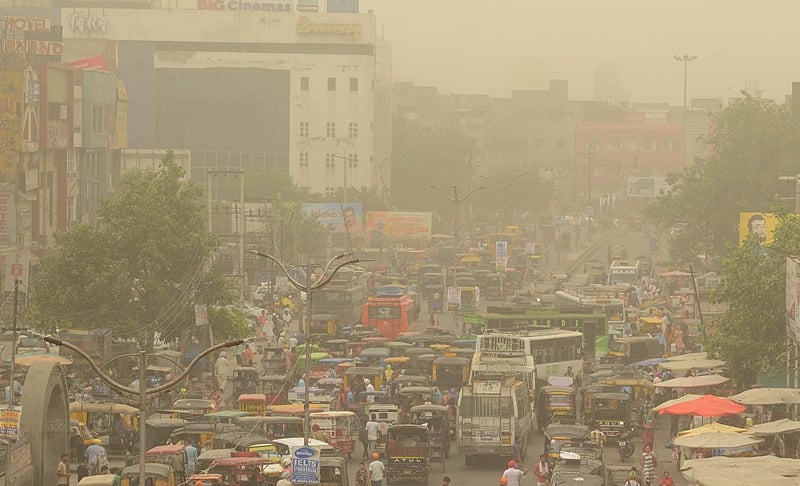New Delhi: Most of India's pollution control agencies remain closed entities when it came to sharing information with the public finds a new rating study by Centre for Science and Environment (CSE) has found on Thursday. A mere handful of India's pollution control boards and authorities adequately putting out environmental and governance information into the public domain,
For calculating the Transparency Index and rating of pollution control boards on public disclosure - as the study is titled - the CSE assessed the data disclosure performance of 29 state pollution control boards (PCBs) and six pollution control committees from across the country. Of these, only 17 boards and committees scored 50 per cent or above. These are from Odisha, Telangana, Tamil Nadu, Madhya Pradesh, West Bengal, Goa, Karnataka, Haryana, Chhattisgarh, Himachal Pradesh, Jammu & Kashmir, Kerala, Maharashtra, Uttarakhand, Punjab, Andhra Pradesh and Rajasthan.
"Governance and functioning-related data remains paper-bound: Information on functioning, actions taken by a board against polluting industries, public hearing data on new projects etc are rarely disclosed or remain difficult to access on the websites," CSE said in a release here.
"State PCBs are entrusted with several functions under the provisions of the Water Act, 1974; Air Act, 1981; Water Cess Act, 1977; and various rules and notifications issued under the Environment (Protection) Act, 1986. One of these functions under Section 17(C) of the Air and Water Acts is to collect and disseminate information related to air and water pollution and also about its prevention, control or abatement. The law asks the boards to share the data in public domain. But this is rarely done in practice," said programme director, Industrial Pollution Unit, CSE, Nivit Kumar Yadav.
Key findings of the report:
Only 12 states have shared their latest annual reports on their websites: Gujarat, Madhya Pradesh, Sikkim, Tripura and West Bengal have shared annual reports of the year 2019-20
Chhattisgarh, Karnataka, Maharashtra, Odisha, Rajasthan, Uttar Pradesh and Tamil Nadu have shared annual reports of the year 2018-19 (which could be termed as the latest considering the COVID-19 situation in 2020).
No initiative has been taken by Assam, Arunachal Pradesh, Bihar, J&K, Jharkhand, Manipur, Andaman & Nicobar, Chandigarh, Daman & Diu, Dadra & Nagar Haveli, Puducherry and Nagaland in sharing their annual reports.
The CSE study also found that 0ut of 35 SPCBs/PCCs, only five have shared soft copies of directions and show cause/closure notices issued on their websites for non-compliance by industries - these are from J&K, Rajasthan, Telangana, Uttarakhand and West Bengal.
Only five boards - Delhi, Goa, Haryana, Tripura and Uttarakhand - have shared minutes of their board meetings on their websites: It is mandatory for SPCBs to meet at least once every three months.
Only five SPCBs have shared information on inspection conducted by the boards: The PCBs of Himachal Pradesh, Karnataka, Odisha, Tamil Nadu and West Bengal have shared this information in their annual reports.
Only nine SPCBs/PCCs have provided detailed information on public hearings, which include the executive summary, draft EIA report of the project, and minutes of the meeting. The states represented are Karnataka, Telangana, Delhi, Gujarat, Kerala, Punjab, Rajasthan, Goa and Mizoram, the study said.

"For this study, CSE collected data from two sources -- websites of SPCBs/PCCs and their annual reports. The study has evaluated the information shared by SPCBs/PCCs during the last four to five years (2016-21) and uses 25 indicators that provide a broader assessment on the type and amount of information shared.
A few key indicators used in the study include the availability of information on direction/show cause/closure notices issued by boards, information on public hearings and EIA reports, non-attainment cities and polluted river stretches etc," programme officer, Industrial Pollution Unit, CSE, and author of the study Shreya Verma said.
Limited data on current pollution levels:
Data indicating the current pollution levels - air pollutants, waste etc - the basic indicators of environment health, is missing.
Most boards display inadequate data, indicating no trends. More so, even details on upcoming projects and grievances of the general public of the locality are hardly displayed.
Only 19 SPCBs/PCCs are displaying their CEMS data, which is mandatory as per a Supreme Court order (February 22, 2017) and an environment ministry directive (GSR 96E January 29, 2018). The states from where these PCBs/PCCs come are Andhra Pradesh, Assam, Bihar, Chhattisgarh, Delhi, Goa, Gujarat, Haryana, Himachal Pradesh, J&K, Jharkhand, Kerala, Madhya Pradesh, Meghalaya, Odisha, Puducherry, Punjab, Tamil Nadu and Telangana.
Laxity in sharing information on solid waste:
Fourteen SPCBs/PCCs do not share any information on municipal waste generation; 11 on plastic waste generation; 10 on hazardous waste; and nine on e-waste.
"We also found a lack of uniformity in displaying data. For instance, all the SPCBs/PCCs surveyed have different formats for their websites, which makes accessing information quite difficult. Similarly, there is no format for annual reports, hence, the information available varies from board to board," Verma said.
Asserting that "improving transparency is a 'must' when it comes to state pollution control boards," Nivit added, "Putting in the public domain the crucial pollution-related information, data and details of actions taken is critical - it can help policy-makers take the discussions to the next level of pollution management, and it can also reassure the people about efficiency of these boards and committees. SPCBs and SPCCs, therefore, must focus urgently to become more transparent by putting out data and improving the quality of their outreach for public engagement."










